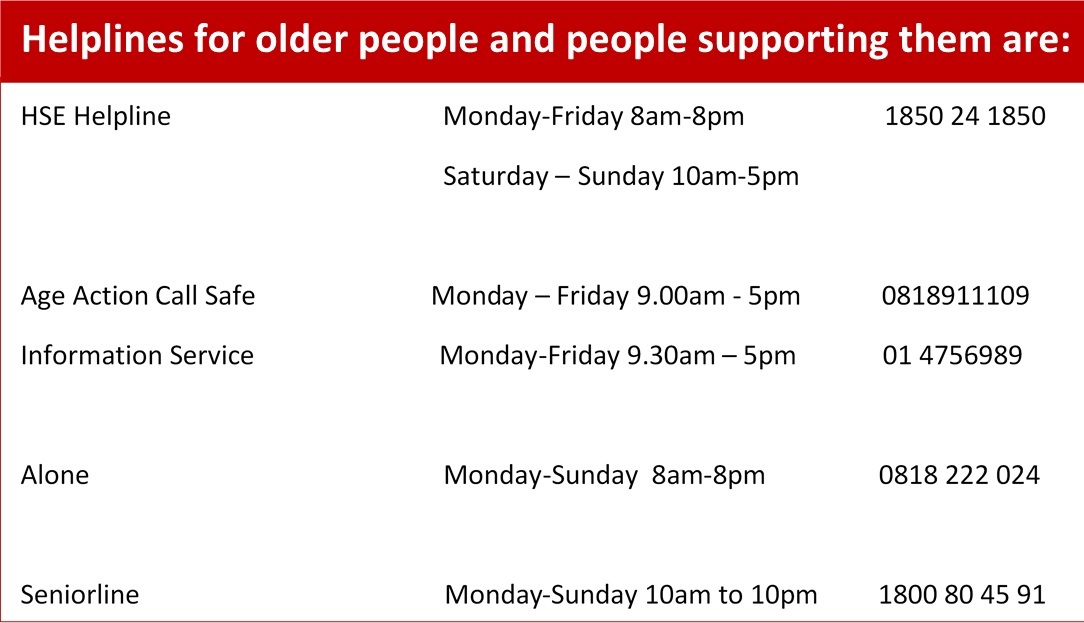An Taoiseach Leo Varadkar announced new measures to stop the spread of COVID-19 or the Corona Virus on the evening of 27 March.
Included in the measures is a concept known as cocooning; this means that those who are over 70 years or those extremely medically vulnerable should not leave their homes, and within their homes should minimise all non-essential contact with other members of their household. This is to protect those who are at very high risk of severe illness from COVID-19 from coming into contact with the virus.
According to the guidelines, if you are over 70 or medically vulnerable you are strongly advised to stay at home at all times and avoid any face-to-face contact for a period of 2 weeks from today (March 27th). This period is being kept under review.
Visits from people who provide essential support to you such as healthcare, personal support with your daily needs or social care should continue, but carers and care workers must stay away if they have any of the symptoms of COVID-19. They may find this guidance for Health and Social care workers who visit homes useful. All people coming to your home should wash their hands with soap and water for at least 20 seconds on arrival to your house and often whilst they are there.
You should have an alternative list of people who can help you with your care if your main carer becomes unwell.
If You Need Support
Age Action reconfigured and scaled up services to support older people and people who support older people in the community in response to COVID-19. You can read more about our services Call Safe and Home Safe as well as an extended Information Service here .
Organisations who work with and for older people have also scaled up their services including a number of helplines which provide listening service and direction to other support services. Phone numbers for support organisations, including Age Action's are available below.

How do I Help my Older Family Member or Friend?
Respond to multigenerational living situations. Households, like communities, may be multigenerational, with different people at different levels of risk living together under one roof. Households, therefore, will need to consider the risks of all its members. Families should have a conversation about how they are going to protect and support their loved ones who are older or with underlying health conditions. Families can introduce changes now by not sharing personal items like towels, water bottles, and utensils.
Develop intentional care plans. Older people may be caregivers, or may depend on the care of a family member themselves. Caregivers and care recipients should discuss their preparation plans, including how to stay in touch via phone or email. Identify someone else who can provide you with the care in case your informal caregiver gets sick.
Family Carers Ireland has developed an Emergency Care Booklet that should be completed in case a carer becomes ill
An online Family Carer Support Group is now up and running. This will be delivered through the Facebook platform, in a closed/private group format. Users will need a Facebook account to participate.
Communicate with providers and those close to you. Now is the time to talk with the people who need to be included in your plan. You may need to ask for help if you become sick. Talk to household members, other relatives, and friends to discuss your response should COVID-19 infections occur in your community. People who live alone should have plans in place, even prior to the onset of any symptoms, for friends, family, and health care providers to safety check on them and provide help if they do, in fact, develop symptoms or become sick. It is important to make a list of vital phone numbers and prescription medications in case you or someone supporting you needs to know this information. We have a handy template available here.
Be informed It is really important that people get accurate information from reliable sources. Over half of people between the ages of 65 and 74 are not online. Without the ability to confidently navigate the internet, a significant proportion of our population are effectively barred from being fully engaged members of society – in the current COVID-19 health emergency they are relying on media and word of mouth for official information. People who are online should share the official Department of Health and HSE information with their older family members, friends and clients to make sure that they are informed and make sure they have phone numbers for local community services.
